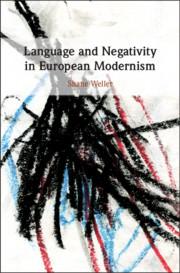‘And more and more my own language appears to me like a veil which one has to tear apart in order to get to those things (or the nothingness) lying behind it.’ So wrote Samuel Beckett in July 1937, describing his own emerging conception of literature, grounded in the idea that, far from being an effective means of expression or a way of mapping the world, language obstructs access both to the outer and to the inner realms. Professor of Comparative Literature Shane Weller’s most recent book, Language and Negativity in European Modernism, explores the relation between literary form and history of a distinct strain of European literary modernism that emerged out of a radical re-engagement with late nineteenth-century language scepticism.
Focusing first on the literary and philosophical strands of this language-sceptical tradition, the book proceeds to trace the various forms of linguistic negativism deployed by European writers in the interwar and post-war years, including Franz Kafka, Georges Bataille, Samuel Beckett, Maurice Blanchot, Paul Celan, and W. G. Sebald.
Through close analyses of these and other writers’ attempts to capture an ‘unspeakable’ experience, Language and Negativity in European Modernism explores the remarkable literary attempt to deploy the negative potentialities of language in order to articulate an experience of what, shortly after the Second World War, Beckett described as a vision of ‘humanity in ruins’.
As Shane Weller describes it in his book: ‘With its roots in late nineteenth-century language scepticism, intensified through the experience of historical catastrophe, the modern European literature of the unword becomes nothing less than an attempt to find the terms in which to begin to rethink our condition in dark times.’
Shane Weller is Professor of Comparative Literature and Co-Director of the Centre for Modern European Literature. His publications include A Taste for the Negative: Beckett and Nihilism (2005), Beckett, Literature, and the Ethics of Alterity (2006), Literature, Philosophy, Nihilism: The Uncanniest of Guests (2008), and Modernism and Nihilism (2011). He is also the co-author (with Dirk Van Hulle) of two volumes in the Beckett Digital Manuscript Project series: The Making of Samuel Beckett’s ‘L’Innommable’/‘The Unnamable’ (2014) and The Making of Samuel Beckett’s ‘Fin de partie’/‘Endgame’ (2018).


